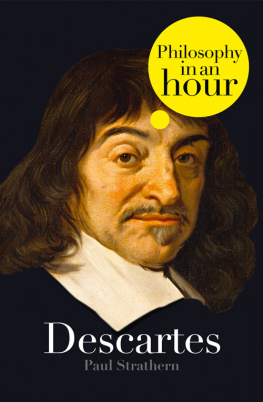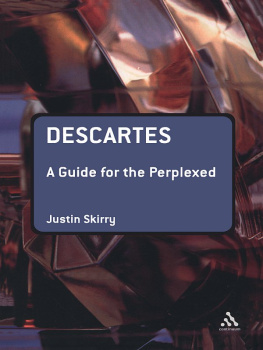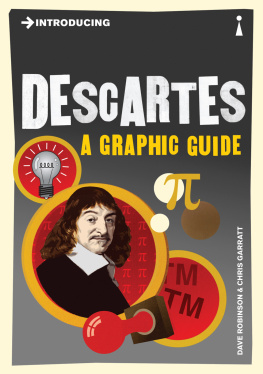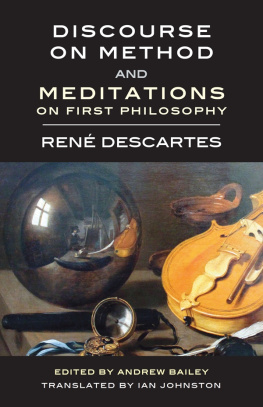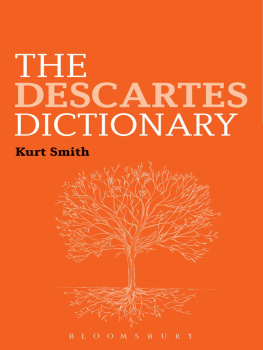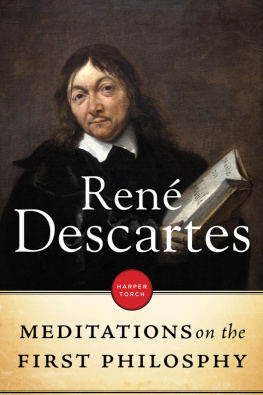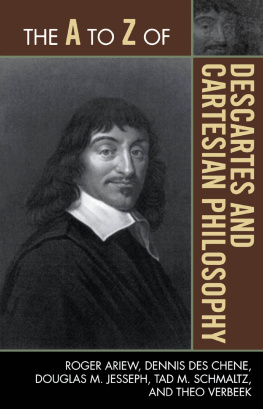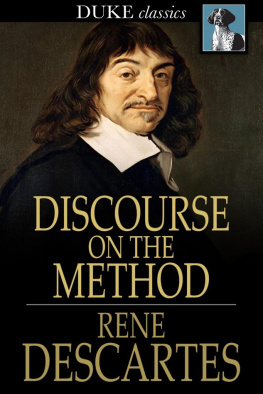Descartes René - Descartes: philosophy in an hour
Here you can read online Descartes René - Descartes: philosophy in an hour full text of the book (entire story) in english for free. Download pdf and epub, get meaning, cover and reviews about this ebook. City: France, year: 1996;2012, publisher: HarperCollins Publishers;Harper Press, genre: Religion. Description of the work, (preface) as well as reviews are available. Best literature library LitArk.com created for fans of good reading and offers a wide selection of genres:
Romance novel
Science fiction
Adventure
Detective
Science
History
Home and family
Prose
Art
Politics
Computer
Non-fiction
Religion
Business
Children
Humor
Choose a favorite category and find really read worthwhile books. Enjoy immersion in the world of imagination, feel the emotions of the characters or learn something new for yourself, make an fascinating discovery.
- Book:Descartes: philosophy in an hour
- Author:
- Publisher:HarperCollins Publishers;Harper Press
- Genre:
- Year:1996;2012
- City:France
- Rating:5 / 5
- Favourites:Add to favourites
- Your mark:
- 100
- 1
- 2
- 3
- 4
- 5
Descartes: philosophy in an hour: summary, description and annotation
We offer to read an annotation, description, summary or preface (depends on what the author of the book "Descartes: philosophy in an hour" wrote himself). If you haven't found the necessary information about the book — write in the comments, we will try to find it.
Descartes: philosophy in an hour — read online for free the complete book (whole text) full work
Below is the text of the book, divided by pages. System saving the place of the last page read, allows you to conveniently read the book "Descartes: philosophy in an hour" online for free, without having to search again every time where you left off. Put a bookmark, and you can go to the page where you finished reading at any time.
Font size:
Interval:
Bookmark:
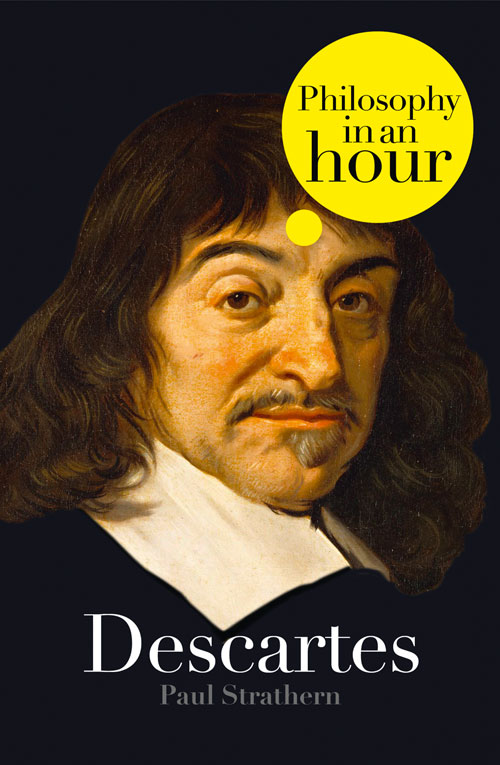
Descartes
PHILOSOPHY IN AN HOUR
Paul Strathern

By the end of the sixteenth century, philosophy had stopped. It was Descartes who started it up again.
Philosophy had begun for the first time in the sixth century B.C . in ancient Greece. Two centuries later it entered a golden era with Socrates, Plato, and Aristotle. Then, for nearly two thousand years, nothing happened. At least, nothing original happened.
Nonetheless several distinguished philosophers appeared during this period. The third-century Alexandrian Plotinus refined Platos philosophy, in the process creating Neoplatonism. St. Augustine of Hippo then refined Neoplatonism to the point where it was acceptable to Christian theology. The Islamic scholar Averros refined parts of Aristotles philosophy, and Thomas Aquinas in turn rendered these acceptable to Christian theology. All four of these disparate figures advanced the course of philosophy, but not one of them produced an entirely new philosophy of his own. Their work was essentially exegesis, commentary, and elaboration of the philosophy of Plato and Aristotle. In this way these two pagan philosophers (and their pagan philosophies) became pillars of the Christian church. This intellectual conjuring trick was the main foundation of Scholasticism, the name given to philosophical activity during the Middle Ages. Scholasticism was the philosophy of the church and prided itself on its lack of originality. New philosophical ideas resulted only in heresy, the Inquisition, and burning at the stake. The ideas of Plato and Aristotle gradually became buried beneath layers of religiously correct Christian commentary, and philosophy dried up.
By the mid-fifteenth century this moribund stage had been reached in almost all fields of intellectual endeavor. The church reigned supreme throughout the medieval world. But already the first cracks were beginning to appear in this vast edifice of intellectual certainty. Ironically the main source of these cracks was the same classical world that had produced Plato and Aristotle. Much learning that had been lost or forgotten during the Dark Ages now began coming to light, inspiring a renaissance (or rebirth) of human knowledge.
The Renaissance brought with it a new humanistic outlook. This was followed by the Reformation, which ended the hegemony of the church. Yet more than a hundred years after these developments had transformed Europe, philosophy remained stuck in the bog of Scholasticism. This came to an end only with the arrival of Descartes, who produced a philosophy fit for the new era. In no time this spread through Europe and even achieved the ultimate accolade of being named after its founder: Cartesianism.
Descartes never did a stroke of useful work in his life. At various times he described himself as a soldier, a mathematician, a thinker, and a gentleman. The last comes closest to describing his attitude toward life as well as his social status. His youthful inclination to a life of leisurely ease soon settled into a routine. He lived on his private income, rose at noon, and traveled when he felt like it. Such was his life no dramas, no wives, no great public success (or failure). Yet Descartes was indisputably the most original philosopher to appear in the fifteen centuries following the death of Aristotle.
By the time Descartes arrived on the scene the Renaissance had brought a new humanistic outlook to Europe, and the Reformation had ended the hegemony of the Catholic church. Yet it remained for Descartes to launch the modern age of philosophy. From this period on, the primacy of the individual and the analysis of human consciousness became fundamental to philosophy, a focus that has only recently been superseded by the primacy of the dictionary and analysis of its contents.
Ren Descartes was born March 31, 1596, in the small town of La Haye, in the Creuse Valley thirty miles south of Tours, France. This spot has now been renamed Descartes, and if you visit it you can still see the house where he was born and the twelfth-century church of St. Georges where he was baptized.
Ren was the fourth child, and his mother was to die in childbirth the following year. His father Joachim was a judge in the High Court of Brittany. This met at Rennes, 140 miles away, which meant that Joachim was at home for less than half the year. He soon remarried, and Ren was brought up in the house of a grandmother. Here his main attachment was to his nurse, for whom he retained the fondest regard. He was to pay for her upkeep until the day she died.
Descartes spent a solitary childhood, accentuated by his sickly nature, and he quickly learned to do without company. From his early years he is known to have been introspective and reserved: a wan-faced child with thick curly black hair and large shadow-ringed eyes, wandering through the orchard in his black coat and knee breeches, a black wide-brimmed hat on his head and a long woolen scarf wound round his neck.
At the age of ten he was sent as a boarder to the Jesuit College that had recently opened in La Flche. This school was intended for the education of the local gentry, who before this had often dispensed with such matters in favor of hunting, hawking, and halfhearted home homiletics. The rector of the college was a friend of the Descartes family, so the frail young Ren was given a room of his own and allowed to get up when he pleased. As with most who are permitted such a privilege, this meant that Descartes rose around noon, a habit he strictly adhered to for the rest of his life. While the other pupils were being browbeaten by vicious and conceited Jesuits versed in the intricacies of Scholasticism, the intelligent young Descartes was thus able to absorb his learning in a more relaxed atmosphere, rising in time for luncheon followed by the riding, fencing, and flute-playing lessons that occupied the afternoon. By the time he came to leave, it was apparent that Descartes had learned far more than anyone else in the school, and his health appears to have completely recovered (apart from a lingering hypochondria, which he carefully nursed throughout his remarkably healthy life).
Yet despite carrying off all the prizes, Descartes retained a deep ambivalence toward his education. It seemed to him to be largely rubbish: rehashed Aristotle encrusted with centuries of interpretations; the stifling theology of Aquinas which had answers for everything but answered nothing; a morass of metaphysics. Nothing he learned appeared to have any certainty whatsoever, apart from mathematics. And in a life devoid of the certainties of home, family, and meaningful social contact, Descartes craved certainty in the only realm in which he felt at home: the intellect. He left school disappointed. Like Socrates before him, he was convinced he knew nothing. Even mathematics was only capable of providing impersonal certainty. The only other certainty he knew was God.
When Descartes left La Flche at eighteen, his father sent him to study law at the University of Poitiers. Joachim Descartes intended Ren to take up a respected position in the legal profession, just as his elder brother had done. In those days such positions were filled largely by nepotism, a system that succeeded in producing approximately the same percentage of ludicrous and inadequate judges as today. But after spending two years studying the law, Descartes decided he had had enough of it. By this time he had come into possession of a number of small rural properties inherited from his mother. These gave him a modest income, enough to live as he pleased. So he decided to set off for Paris to pursue his thoughts. Judge Joachim was not pleased the Descarteses were gentlemen and werent expected to spend their time thinking. But there was nothing he could do about it: his son was now a free man.
Font size:
Interval:
Bookmark:
Similar books «Descartes: philosophy in an hour»
Look at similar books to Descartes: philosophy in an hour. We have selected literature similar in name and meaning in the hope of providing readers with more options to find new, interesting, not yet read works.
Discussion, reviews of the book Descartes: philosophy in an hour and just readers' own opinions. Leave your comments, write what you think about the work, its meaning or the main characters. Specify what exactly you liked and what you didn't like, and why you think so.

